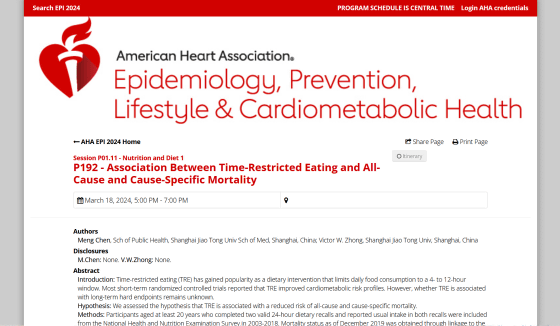Survey results show that the ``8-hour diet,'' in which you finish your daily meals within 8 hours, is associated with an increased risk of death from cardiovascular disease.

The 8-hour diet is a diet method in which you finish your daily meals within 8 hours and do not eat for the remaining 16 hours.
Association Between Time-Restricted Eating and All-Cause and Cause-Specific Mortality
https://www.abstractsonline.com/pp8/#!/20343/presentation/379

Time-restricted eating may raise cardiovascular death risk in the long term | American Heart Association
https://www.heart.org/en/news/2024/03/18/time-restricted-eating-may-raise-cardiovascular-death-risk-in-the-long-term
8-hour intermittent fasting tied to 90% higher risk of cardiovascular death, early data hint | Live Science
https://www.livescience.com/health/food-diet/8-hour-intermittent-fasting-tied-to-90-higher-risk-of-cardiovascular-death-early-data-hint
Intermittent fasting may raise risk of heart disease death, study shows - The Washington Post
https://www.washingtonpost.com/wellness/2024/03/18/intermittent-fasting-time-restricted-eating/
Diets that limit the amount of time you eat each day are called 'continuous fasting,' and are said to help you lose weight and gain a variety of health benefits without restricting your calories. Among them, the ``8-hour diet,'' which limits eating time to 8 hours a day, is widely adopted by the average person.
A research team led by Professor Victor Wenze Zhong of the School of Medicine at Shanghai Jiao Tong University conducted a study on approximately 20,000 samples collected from 2003 to 2018 by the National Health and Nutrition Examination Survey, which targets American adults. We analyzed human data. The subjects responded at least twice to ``all food and drinks consumed in the past 24 hours and the time of consumption,'' and were tracked for a median of 8 years for deaths from cardiovascular disease and cancer.
The research team calculated the typical ``meal time of the day'' from the ``time of the first meal of the day'' and ``time of the last meal of the day'' answered by the subjects. We then analyzed the relationship between daily meal times and mortality rates from cardiovascular disease and cancer.

As a result of the analysis, ``people who finished their daily meals within 8 hours'' were more likely to die from cardiovascular diseases such as heart disease and stroke during the follow-up period compared to those who ate over 12 to 16 hours. It turns out that the sex is about twice as large. Even in subjects who already had cardiovascular disease or cancer, eating for less than eight hours was associated with an increased risk of death.
Additionally, people who ate within 8 hours a day tended to have less lean muscle mass, which is the amount of fat and internal organs removed from their body weight, compared to those who ate over a longer period of time. This is consistent with past
'We expected that long-term adoption of the 8-hour diet would reduce the risk of cardiovascular disease and all-cause mortality,' Zhong said. We were surprised to find that people who limit their daily use to less than eight hours have a higher risk of dying from cardiovascular disease and don't live as long.'

However, this study only showed a correlation based on observational research, and did not show a causal relationship that ``8-hour dieting increases the risk of death from cardiovascular disease.'' In addition, the subjects did not answer that they were on an 8-hour diet, and it is possible that they were eating within 8 hours a day due to unavoidable circumstances.
Christopher Gardner , director of nutrition at Stanford University's Center for Prevention Research, says, ``It's possible to eat poor quality food while on a time-based diet,'' and ``all subjects had the same level of disposable income and stress.'' Or are the people who eat within eight hours a day just because they're so stressed out, working three jobs, that they don't have time to eat? They wanted to see more detailed data, including demographic differences.
Zhong also said that while the results of this study call for caution about intermittent fasting, especially for heart disease and cancer patients, ``it is difficult to give specific advice on hourly dieting based solely on our study.'' It's too early,' he said. They emphasize that more precise studies are needed to draw conclusions and that they need to be evaluated in other populations around the world.
Related Posts:







